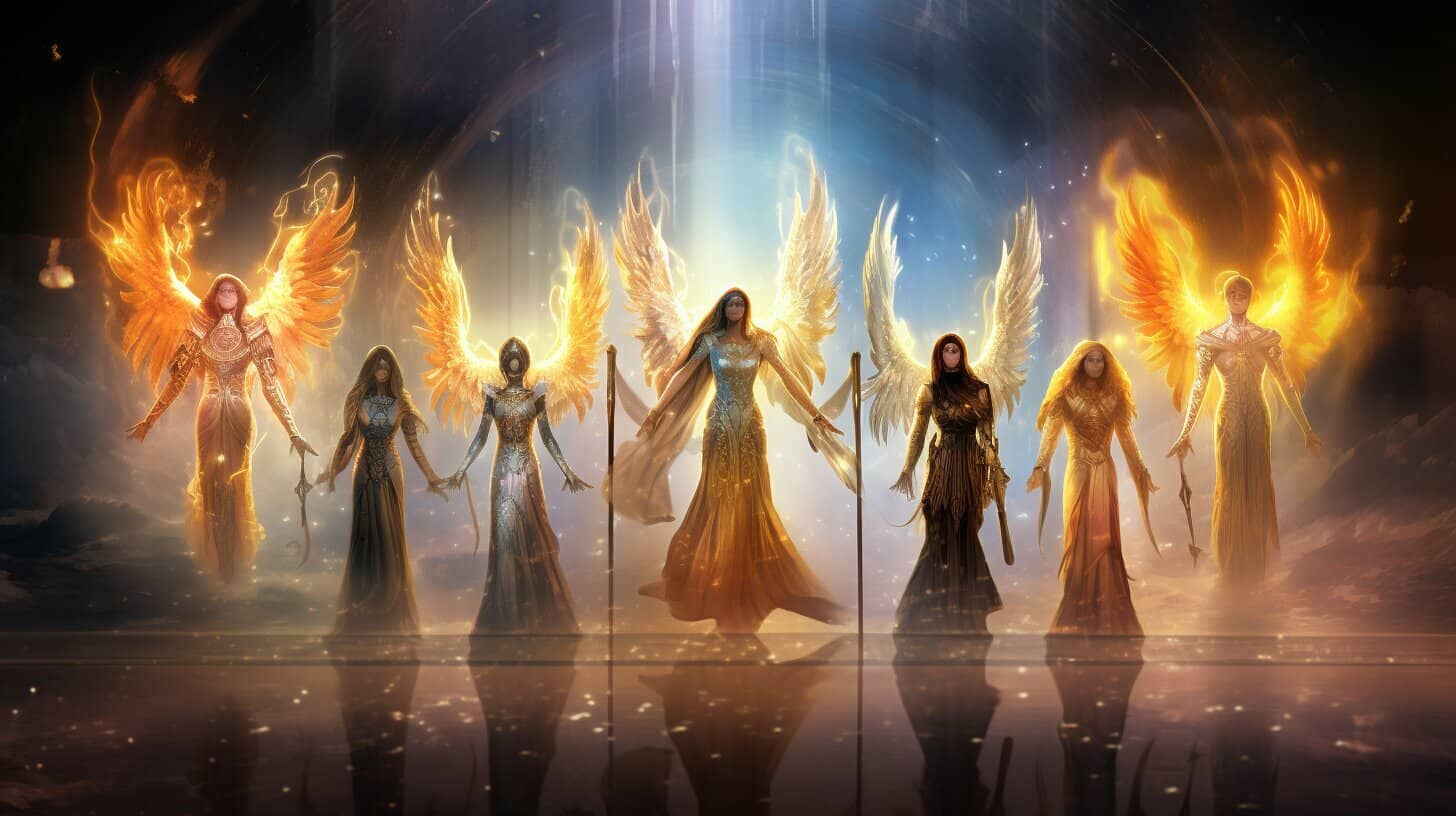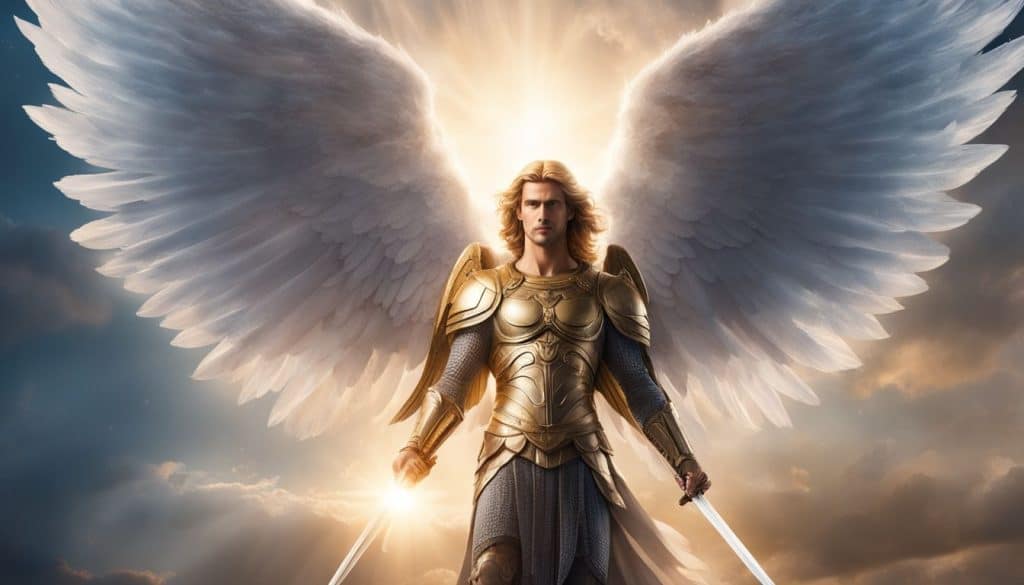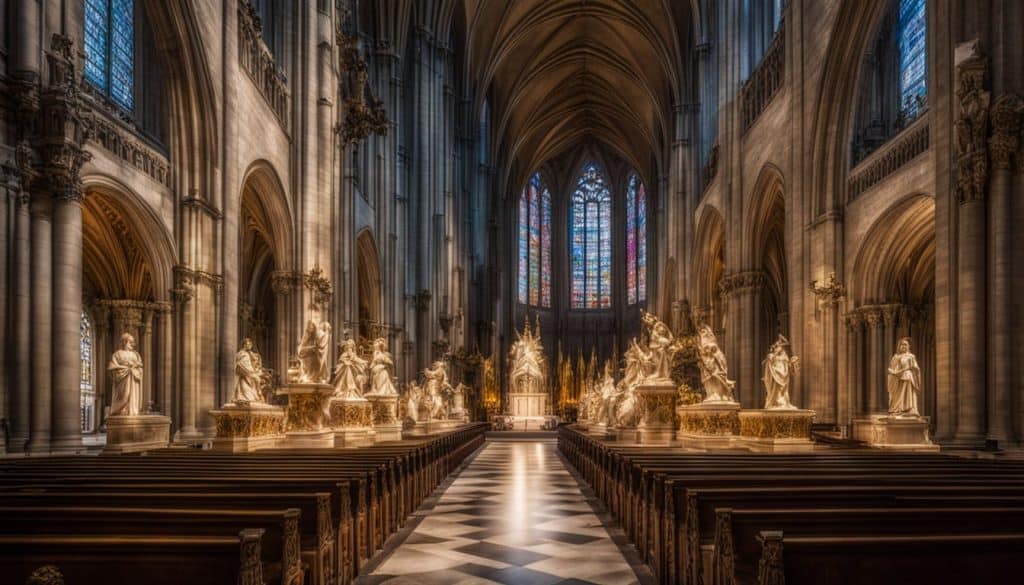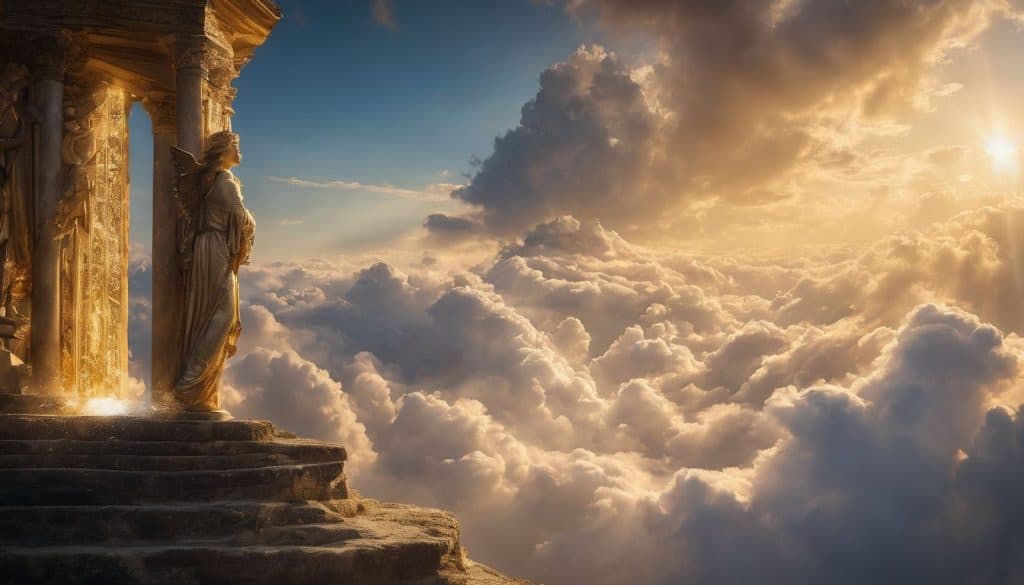Most Powerful Angels of God

Unveiling the Most Powerful Angel of God: Our Divine Guardians
Ever find yourself utterly fascinated by the enigmatic world of heavenly figures that dance through the storied passages of sacred texts? What about the most powerful Angels of God? If thoughts of angelic beings spark your curiosity and send your spirit soaring, rest assured you're in good company.
There’s a certain allure to these celestial envoys that many of us feel drawn to explore—their roles and ranks within God's universal plan are indeed an enthralling puzzle.
I'm Diana, creator of Spiritual Eden on Facebook. Just like you, I've been captivated by these questions about the divine assembly above us. Through years dedicated to poring over religious scriptures and immersing myself in diverse spiritual belief systems, I've come across some truly intriguing insights into our otherworldly allies—particularly those shared at Spiritual Eden on Facebook.
One tidbit that might catch your interest: Angels grace the Bible’s pages more than 300 times! This blog post is my way of opening up about what I’ve uncovered regarding the most formidable angels—their esteem, their missions, and how they weave into different faith narratives.
Join me as we delve deep into this treasure trove of ancient wisdom and theological reflection. I’m thrilled to share with you a glimpse into heaven's elite guardians and heralds through words steeped in devotion and study.
So let’s step together onto this path illuminated by knowledge—your guide awaits just below for an excursion into the sanctified unknown.
Key Takeaways
- Angels are ranked in a divine hierarchy with the Seraphim at the top, known for their closeness to God and their role as "the burning ones."
- Archangel Michael is venerated across religions as a protector and leader of God's armies, while Lucifer represents pride and rebellion after falling from grace.
- Different religious traditions have unique perspectives on angels; for instance, Islam names four archangels including Jibril (Gabriel) and Azrael, the angel of death.
- The angelic orders range from high-ranking celestial beings like Thrones and Dominions to guardian angels who interact directly with humans.
- Beyond Judeo-Christian beliefs, other cultures feature divine messengers similar to angels such as devas in Buddhism or spiritual entities serving Ahura Mazda in Zoroastrianism.
Who Are the Most Powerful Angels According to the Bible?

As we delve into the celestial framework that shapes our spiritual understanding, it's essential to acknowledge the mightiest beings residing just beyond human perception: the most powerful angels as depicted in biblical scriptures.
"I am Raphael, one of the seven holy angels who present the prayers of the saints and enter into the presence of the glory of the Holy One." - Tobit 12:15
These divine agents wield extraordinary influence and authority, fulfilling roles critical to both heavenly order and earthly guidance.
Learn more about: Inspiring Quotes About Guardian Angels
Seraphim
I've always been captivated by the seraphim, those divine beings enveloped in ceaseless flames. They dance close to God's presence, singing "holy, holy, holy," and it's said their brilliance is overwhelming—too pure for human eyes.
In sacred texts like Isaiah's vision in the Old Testament, they rank among the most powerful angels of God, living symbols of light and fiery love.
Imagine these celestial entities with not one but six wings; two veiling their faces in humility before God, another pair covering their feet as a sign of reverence, and with the last set they soar through the heavenly realm.
Their role goes beyond just worship—they are guardians of God's glory and act as messengers between the divine and human worlds. It’s profound, isn't it? How such stories weave through different faiths connecting us to something greater than ourselves—the spiritual journeys we're on and our quests for emotional healing find echoes in these tales of heavenly warriors whose existence sings devotion.
Archangel Michael
Archangel Michael stands as a towering figure of strength and protection in the spiritual realm, often depicted with a flaming sword ready to battle evil forces. In my journey through religious texts, I've always found him mentioned as a symbol of divine protection.
He's known to lead God's people through challenging times, offering courage when facing darkness. As one of the chief princes (or great prince) in the Christian tradition, Michael commands respect and admiration from believers across various religions.
His name itself means "Who is like God?", signifying his significant role as the leader of the heavenly armies. In tales passed down over centuries, he triumphed during the war in heaven against fallen angels led by Lucifer.
Learn more about: How You Know What Your Angel Number Is
Serving as a beacon for those seeking righteousness, he guides souls toward spiritual growth while safeguarding them against evil spiritual forces. This recognition places Archangel Michael at an elevated status among celestial beings; it's no surprise many look up to him for guidance on their spiritual path.
Moving beyond this mighty warrior angel brings us closer to understanding another pivotal messenger: Archangel Gabriel, whose announcements have altered human history time after time.
Archangel Gabriel
Gabriel holds a revered spot in the celestial ranks as the messenger angel, entrusted with delivering God's word to His people. With profound grace, Gabriel brought the divine message to the Virgin Mary, announcing her pivotal role as Mother of Jesus and securing his place in history as an angel of revelation.
This archangel not only appears in Christian narratives but also plays a significant role across Abrahamic religions; you'll find Gabriel's presence deeply interwoven within Islamic scripture too.
Known for unparalleled obedience and service to the Creator's will, Gabriel often takes human form to interact with key figures throughout religious texts. Take for example Daniel from the Book of Daniel or Zechariah—without hesitation, this heavenly herald steps into our world bringing guidance and wisdom that profoundly impact human destiny.
Next up is Lucifer—a subject surrounded by intrigue and countless tales throughout biblical history.
Lucifer
Moving from the archangel of messages to a figure shrouded in infamy, Lucifer once held a significant place among the divine. I've learned that his tale serves as a stark reminder of pride's fall; he was an angelic being of exceptional power and beauty who stood close to God's presence.
In the stories told across texts like Isaiah and other apocryphal writings, Lucifer is depicted not only as a bearer of light but also as an icon of free will gone awry. His choice to rebel against the heavenly hierarchy set into motion events leading to his expulsion from Heaven, thus becoming the fallen angel—a narrative that often overshadows his origins.
Lucifer's journey is commonly associated with the ultimate descent from grace, transforming him into a symbol of rebellion and evil—especially within Christian theology. It fascinates me how this single angelic figure could embody such complex themes: boundless love turned to unparalleled defiance, radiance dimmed by darkness.
Exploring Lucifer’s role offers insights into concepts far greater than just one individual—it opens up discussions about morality, authority, and the consequences following our choices in life or depictions within spiritual mythology.
Abaddon/Apollyon
I recently delved into the lesser-known but equally intriguing figure of Abaddon, also known as Apollyon in the New Testament. This entity stands out in the scriptural texts as an angel—or perhaps a fallen one—of destruction and doom.
Found within the pages of the Book of Revelations, his name means "Destroyer" in Hebrew. He commands an army of locusts that symbolize a powerful and devastating force against those who oppose divine will.
Abaddon holds a unique place among holy angels and evil angels alike; his role is complex, stirring discussions about what he truly represents. His presence signals significant turning points or moments of judgment and upheaval within biblical narratives—and these aren't just simple tales of good against evil but layered stories that prompt us to consider deeper meanings behind divine justice and its execution on Earth.
The Hierarchy of Angels

As we delve into the celestial order, it's fascinating to explore the structured ranks that govern the heavenly hosts. The angelic hierarchy is a tapestry of divine roles and responsibilities, with each tier revealing a unique aspect of God's spiritual army.
The Highest Orders
In my journey exploring the divine hierarchy, I've come across fascinating insights about the most revered angels. They stand in the presence of God and serve as His mightiest messengers.
- Seraphim tops the list, enveloped in mystique and awe. Known as "the burning ones," they're close to God, constantly singing praises with a chorus of "Holy, Holy, Holy." Their fiery passion symbolizes purity and cleansing.
- Cherubim holds a special place with its vast wings and profound knowledge. They guard Eden's gates and God's glory with unwavering vigilance.
- Thrones appear as the third highest order, embodying divine justice and authority. Often depicted as great wheels with many eyes, they bear God's throne and emit an aura of true peace.
- Dominions govern the lesser angelic orders, ensuring that the cosmos remains harmonious. They rarely make contact with humans but are instrumental in executing God's will throughout the universe.
- Virtues bestow blessings upon Earth; they are invigorating spirits who inspire people to maintain strong faith.
- Powers confront all forms of chaos and opposition to bring order from disorder – spiritual warriors tasked with overseeing history's timeline.
The Middle Orders
As I delve into the angelic realm, the middle orders of angels hold a fascinating place. They act as divine warriors and messengers of God, bridging the gap between heaven and earth.
- The Dominions: These celestial beings regulate the duties of lower angels. They receive orders from higher ranks and ensure that the cosmos remains in order.
- Virtues: Known for their control over the elements, Virtues are tasked with supervising nature and the heavens. They perform miracles for people on Earth.
- Powers: As guardians against demons, Powers maintain balance in spiritual warfare. They symbolize the author and protect humanity from evil forces.
- Archangel Raphael: A well-known archangel who serves within this stratum. He is recognized as the patron of travelers and healer of God’s people.
- Archangel Uriel: Often cited for bringing divine inspiration, Uriel shines a light on difficult situations. Traditionally considered one of the seven archangels, he encourages beautiful thoughts.
- Archangel Jeremiel: Tasked with providing visions and understanding of prophecy, Jeremiel often appears to those experiencing life reviews or seeking spiritual clarity.
The Lowest Orders
I often find the lowest orders of angels in religious texts truly fascinating. They may not stand at the top of the angelic hierarchy, but they hold crucial roles in both heaven and earth.
- Principalities: These beings oversee groups of people, nations, and realms of existence. Their primary job is to implement the divine order and influence earthly leaders to make just decisions.
- Archangels: Known as God's messengers, archangels carry out high-level tasks for humanity. The role of Saint Michael as a protector and leader against evil forces stands out significantly here.
- Angels: Often considered the only angel class that interacts directly with humans, these celestial spirits guide individuals toward good deeds and spiritual growth.
- Guardian Angels: Each soul is said to have a dedicated guardian angel from this order. They provide personal safety and spiritual guidance throughout our lives.
- Virtues: This group bestows blessings upon Earth and is believed to be behind miracles witnessed by mankind.
- Powers: Tasked with combating evil spirits, powers maintain a balance between good and evil in the cosmos.
Historical Context
As I explored the divine legacy of God's most supreme angels, I felt it crucial to analyze how the perception of these celestial beings has transformed throughout history. After extensive research spanning millennia, intriguing patterns surrounding humanity's relationship with angelic figures emerged.
In ancient Mesopotamia, powerful guardian spirits served as the prototype for what would later become biblical angels. As monotheism rose, concepts surrounding angels evolved - no longer embodied gods themselves, they became divine intermediaries between the supreme God and humanity. By the Middle Ages, a hierarchical order emerged - angels categorized in spheres of increasing holiness.
My research reveals how during times of hardship - war, plague, unrest - directly seeking the protection of angels grew in popularity. Prayer cards and amulets invoking their miracles increased. Even politically, angels held significance - with kings and leaders claiming angelic endorsement for credibility. In modern times, interest in angels as healers and protectors persists - yet the New Age movement also brought expanded ideas around our capacity to personally connect with them.
By tracing angels throughout history, intriguing patterns in my works illustrate how these winged wonders have been adapted to suit humanity's needs - yet retain their ultimate divine purpose. Our interchange with their glory only amplifies across the centuries.
Other Traditions and Interpretations
Beyond the familiar Judeo-Christian narrative, a fascinating spectrum of beliefs about divine beings permeates various cultures—each offering its take on celestial hierarchies.
Let's expand our horizons and explore how angels are viewed in different religious traditions, shedding light on the global tapestry of spiritual understanding.
Islam
In Islam, angels hold a special place as messengers and servants of God. They are perfect beings created from light, with no free will to sin; their existence is dedicated purely to worshiping Allah and carrying out His commands.
Among them, four archangels stand prominent: Jibril (Gabriel), who brought the Quran to the Prophet Muhammad; Mikail (Michael), responsible for providing nourishment for bodies and souls; Israfil, poised to blow the trumpet signaling Judgment Day in Islamic eschatology; and Azrael, often known as Malak al-Maut or the angel of death, tasked with parting souls from their physical forms when their time arrives.
Each provides unique services on behalf of God in the vast spiritual plane that intersects with our mortal world. For instance, Jibril's presence was vital during pivotal moments like revealing holy scripture or guiding prophets in their missions.
Similarly, stories abound about Azrael's sign of humility towards human life as he gently takes away people’s souls at their appointed time – a concept both sobering and evocative regarding life's transience under divine watch.
Engaging with these beliefs gives me an expansive view into hallowed traditions beyond my faith - enriching my understanding of how numerous cultures envision celestial intermediaries working across realms within gods' orders.
Other Religious Beliefs
Diving into a tapestry of divine beliefs reveals that angels aren't unique to Christianity. Many cultures and religions have their versions of celestial messengers. Let's explore some diverse perspectives on these beings beyond the archangels Michael and Gabriel or narratives like the Book of Enoch.
Zoroastrianism, for example, introduces us to a fascinating pantheon of spiritual entities that serve Ahura Mazda, reflecting an ancient dualistic worldview.
In Judaism, we encounter a rich angelic tradition different from what’s outlined in Protestant Bibles or Catholic teachings. Jewish holy texts describe various angels with tasks ranging from recording deeds to guarding sacred spaces, much like their Christian counterparts but distinct in name and nature.
Meanwhile, Buddhist cosmology recounts devas who bear similarities to angels; less about conveying messages and more focused on living in different heavens within the cosmic realms.
These explorations remind us that looking at other religious beliefs isn't just enlightening; it broadens our understanding of spirituality across human history.
Personal Stories and Testimonials

In my intimate exploration of God's most supreme angels, I felt it vital to highlight profound personal encounters with these celestial beings. Seeking first-hand testimonials allowed me to connect with everyday people and analyze angelic interventions in their lives. The breadth of healing miracles, divine prophecy, and protection against grim fates left me awestruck.
I met Stacy, nearly killed in a devastating car crash until a towering, radiant figure appeared, lifted the wreckage, and transported her safely to the roadside. I spoke with Michael, who after fervent prayer found his cancer spontaneously vanished the next day - doctors claimed it medically impossible yet he swears angelic healing. Emma recalled foretelling dreams of danger sent by her guardian angel that precisely saved loved ones from a violent robbery.
Across ages, ethnicities, and backgrounds, transformed lives through angelic intervention persisted. Despite no prior spiritual affinity, these individuals developed unshakable faith in heavenly guides after their help materialized in desperate times of need. Their stirring stories undeniably confirmed that supreme celestial beings connect intimately with seekers to uplift human life through divine Godly channels.
By courageously sharing their sacred testaments, these witnesses supremely exemplified the life-altering force of angelic aid. Their divine mercy uplifts the faithful, offering hope and spiritually transformative healing to those who invite heavenly connection.
https://spiritualeden.com/most-powerful-angels-of-god/
Comments
Post a Comment